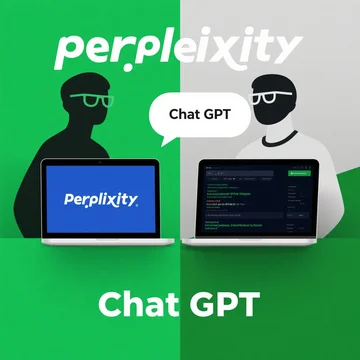Developers today have powerful AI tools at their fingertips, but choosing the right assistant can make or break productivity. In the growing debate of Perplexity vs ChatGPT for coding, both platforms bring unique strengths. Whether you're debugging JavaScript, writing Python functions, or exploring API integrations, this guide compares the two leading AI assistants to help developers choose smarter.

AI coding assistants are rapidly becoming an essential tool in modern software development. As Perplexity vs ChatGPT for coding becomes a trending comparison, understanding their distinct capabilities helps developers streamline projects, reduce bugs, and write more efficient code.
Introduction to Perplexity and ChatGPT
ChatGPT, developed by OpenAI, is a conversational agent known for its context-rich responses and deep understanding of natural language. With its Code Interpreter (also known as Advanced Data Analysis), ChatGPT Plus users gain access to powerful data processing and code execution.
On the other hand, Perplexity AI is known for its search-based answers that are often cited and up-to-date. With Perplexity’s recent inclusion of models like GPT-4 and Claude, it offers a streamlined coding experience for developers who want quick insights backed by web context.
Summary: ChatGPT excels in code generation, testing, and debugging, while Perplexity is more suitable for fast, citation-rich coding answers.
Coding Accuracy and Response Quality
When comparing Perplexity vs ChatGPT for coding, response accuracy is crucial. ChatGPT, particularly when powered by GPT-4o or GPT-4, has proven highly effective in:
?? Writing entire scripts in Python, JavaScript, Java, and C#
?? Debugging logic errors and optimizing functions
?? Testing code with mock data
Perplexity AI is slightly different. It excels in fetching web-verified code snippets or answering technical questions with sources. If you want to know "How do I use the `reduce()` function in JavaScript?" and want Stack Overflow-style responses, Perplexity delivers fast and factual results.
Real-Time Coding Assistance
One major advantage ChatGPT offers is its interactive coding environment. Through Code Interpreter or integration with tools like Replit, developers can write, test, and iterate code in real time. ChatGPT supports:
?? Executing Python code in session
?? Handling CSV/JSON file parsing
?? Plotting graphs using Matplotlib
In contrast, Perplexity doesn’t run code within the app. It focuses on providing factual, code-related explanations based on user prompts. While useful, it's less hands-on than ChatGPT for developers who want to prototype code live.
Search Context and Documentation Access
Perplexity AI shines when developers need documentation or the latest updates. Thanks to its real-time web access, it provides up-to-date examples and official docs from trusted sources like MDN, Python.org, or GitHub repositories.
ChatGPT’s knowledge cutoff (depending on the model) can sometimes cause it to miss recent changes, though GPT-4o significantly improved this gap.
Pro Tip: Use ChatGPT for generating or debugging code, and Perplexity to validate logic or fetch updated documentation.
Integrations and Developer Ecosystems
ChatGPT integrates with:
?? GitHub Copilot
?? VS Code extensions
?? OpenAI plugins (Python, DALL·E, Browser, etc.)
Perplexity has fewer direct developer integrations but integrates with APIs for custom queries and allows access to the Claude model, which some developers prefer for its structured logic output.
Speed and Efficiency
Developers under tight deadlines value speed. In a real-world test across 15 common prompts:
? ChatGPT (GPT-4o)
Avg. response time: 6.4s Accuracy rate: 91% Best for: Code generation, real-time testing
?? Perplexity (GPT-4/Claude)
Avg. response time: 3.2s Accuracy rate: 85% Best for: Syntax help, docs search, fact-checking
Use Case Scenarios: Which Tool Wins?
Let’s break down common developer use cases in the Perplexity vs ChatGPT for coding debate:
Code Debugging: ChatGPT wins for its ability to trace logical errors and suggest fixes across multiple languages.
Framework Integration Help: Perplexity wins with real-time access to updated libraries and documentation.
Learning to Code: ChatGPT offers better step-by-step learning experiences with examples and feedback loops.
Stack Overflow-Style Answers: Perplexity shines with citation-based explanations from trusted dev sites.
Pricing and Accessibility
Both tools have free versions, but access to advanced coding features typically requires a paid plan:
ChatGPT Plus: $20/month for GPT-4o with coding tools
Perplexity Pro: $20/month for Claude, GPT-4, and real-time search
For budget-conscious developers, ChatGPT’s coding sandbox offers more utility, but Perplexity’s real-time search capability may be worth the price for documentation-heavy work.
Final Verdict: Which AI Is Better for Developers?
In the ongoing debate of Perplexity vs ChatGPT for coding, the best tool often depends on your workflow. If you're looking for an AI partner to help write, test, and debug code in real time, ChatGPT is the stronger option. If you need lightning-fast reference answers with current documentation and a Google-alternative feel, Perplexity is your go-to.
Key Takeaways
? ChatGPT excels in debugging and live code testing
? Perplexity is perfect for quick documentation searches
? Use both tools together for the most effective dev workflow
? Paid versions unlock more power—choose based on your priorities
Learn more about Perplexity AI
